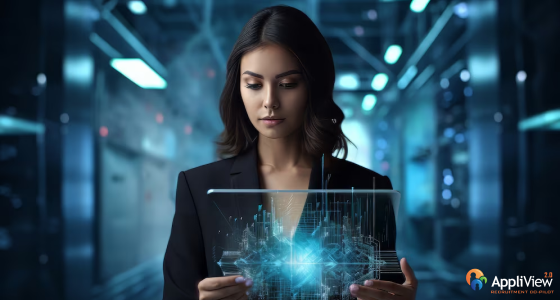Humanizing AI: Transforming HR for the Digital Age
April 26, 2024

AI has revolutionized human resources by optimizing tasks, analyzing data, and making decisions. However, it’s crucial to maintain a human element in HR practices. AI can enhance efficiency, reduce costs, and improve judgment, but it also poses challenges. To humanize AI in HR, organizations should prioritize employee engagement and well-being. This includes integrating AI-driven analytics for predictive talent management, creating personalized learning programs, and enhancing recruitment tools. Companies have successfully integrated AI into their HR processes, resulting in faster recruitment, higher employee retention, and improved decision-making. As technology advances, AI and HR will continue to evolve, with future developments like augmented analytics and virtual HR assistants.
Humanizing AI: Transforming HR for the Digital Age
Human resources is not an exception to the rule that technology has become an essential component of business operations in the current digital environment, which is characterized by rapid change. The incorporation of AI has been a highly consequential technological development in the field of Human Resources. This integration has fundamentally transformed conventional HR procedures and has enabled a more streamlined and individualized approach to talent administration. To ensure a smooth transition into the digital age, it is crucial to maintain a human element in HR practices despite the considerable enthusiasm surrounding the potential of AI.
Comprehending the Function of AI in HR

The utilization of artificial intelligence technology to optimize a range of human resources operations, including talent development, employee engagement, performance management and recruitment is referred to as AI in HR. Organizations have the ability to optimize HR efficiency and effectiveness by utilizing AI-powered tools and algorithms to automate repetitive tasks, analyze substantial amounts of data and make decisions based on research and analysis.
Humanizing AI in Human Resources: An Urgent Need
Although AI provides a multitude of advantages in the field of HR, such as increased efficiency, decreased expenses, and improved judgment, it also poses certain difficulties, most notably in preserving the human aspect of HR procedures. It is essential to establish a balance between automation and personalized employee experiences in a technologically dominant era. In the end, human resources is about people; therefore, AI should supplement rather than completely supplant human efforts.
Guidelines for Humanizing AI in Human Resources
Organizations must adopt best practices that prioritize employee engagement and well-being in order to humanize AI in HR. This consists of integrating AI-driven analytics for predictive talent management, utilizing AI to create personalized learning and development programs & integrating AI-powered recruitment tools that improve the candidate experience. Through the integration of AI’s efficacy and human interaction’s empathy, organizations have the ability to foster a human resources environment that is more inclusive and centered around individuals.
Determining Which AI Technology Suits Your HR Requirements

Enterprises must take into account various aspects when choosing AI technology for human resources, including scalability, integration capabilities and congruence with organizational objectives. Through the comparison of prevalent AI tools utilized in HR operations, organizations can enhance their decision-making process by considering their unique needs and financial limitations. Whether you are a startup or a large enterprise, selecting the appropriate AI technology can result in substantial increases in employee satisfaction and HR efficiency.
Prospects for the Humanization of AI in HR
As technology advances the convergence of AI and HR will likewise progress. Augmented analytics, AI-powered employee engagement platforms & virtual HR assistants are forthcoming developments that have the potential to revolutionize the HR industry by introducing fresh avenues for advancement and effectiveness. Organizations that adopt these developments and modify their human resources strategies in response will attain a competitive advantage in the realms of talent acquisition, retention, and development.
Conclusion
Basically, if companies want to do well nowadays, they need to make AI in human resources more human-like. By combining AI’s abilities with human empathy, they can create a better HR system that’s simpler and more personalized. If you’re interested in using AI for your HR and need help, get in touch with us. Our experienced team can give you tailored solutions to make sure you and your employees get the best out of it.
